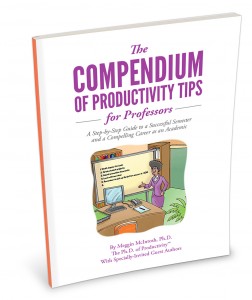Preparing For Times When Sick by Meggin McIntosh, PhD

No one ever plans to be sick. No one ever thinks he or she will need to cancel class, appointments, or other commitments. But…it happens. Here are 10 productive ways to be ready…”just in case.”
- When you record an appointment in your planner (either paper or electronic), include the person’s email address and phone number. Make it a habit to do so. If you need it, it’s there. If you don’t need it, it took 10 seconds so you haven’t invested too much time.
- If you have a committee (or other assemblage) with whom you will be meeting, have their email addresses already in a “group” in your email program. It will be helpful to have that for notifications of meetings or for follow-up. And, if you need it to quickly send out an announcement that you are out sick, you already have the group email established.
- Make plans with your students ahead of time if you will email them about any class cancellation due to your illness. Establish the protocol prior to needing it and set up their emails in a group so it is an easy notification to do.
- Make plans with your students if they will receive a phone call if you are out sick. This works if you have a small graduate seminar and someone who can help make the phone calls. Of course, you will need accurate phone numbers from your students. I used this tip for the rare occasion that I was out sick because so many of our university students drove 60 – 90+ minutes to get to class and a note on the door was not going to be met with much pleasure.
- Make plans with your students about posting on your website or class blog (or Facebook fan page) if you are going to be out sick. You can establish the idea that they should always check 2 hours ahead of time for any change in status.
- Make arrangements with a colleague about trading class “coverage” if one of you is ill. You both hope that it never happens, but it’s nice to know that you have already put a plan in place should one be needed.
- Use technology if you are able to teach (or chair a meeting), but just can’t come to class (or the meeting) in person. Imagine if you fell and broke your ankle and your doctor said you were to stay home with your leg elevated for 3 days. You could get yourself set up in your home office to teach the class either using just the telephone (using a bridgeline – e.g., All Free Conference) or a webcam. Students can still be served and you can still tend to your injury.
- Acknowledge that you are sick – sooner rather than later. This gives you time to make arrangements and to be respectful by notifying others while they still have time to alter their plans. It is not heroic to hang on until the last minute to decide you are too sick to fulfill your class, committee, or other commitment. Doing so removes your options – and others’ options.
- Use a tickler system (1-31 file) in your office so that you can call someone to check it to see what is in there. This works much better than having various and sundry pertinent items strung around your office and trying to tell people where to look for them.
- Start cancelling non-essential appointments when you see that you are coming down with something so that you give yourself time to get better. In the short and long run, you are better off (and so are the rest of us!)
Use one or all of these ideas to set yourself up well for the academic year. Planning and preparation make a big difference and not one of these ideas takes long to implement.
 And as a college or university faculty member, you have many opportunities for success and failure. If you would like additional tips, tools, and techniques that you can use to support your successes, then you will want to access the The Compendium of Productivity Tips for Professors a step by step guide that will help you have a successful year and a compelling career as an academic.
And as a college or university faculty member, you have many opportunities for success and failure. If you would like additional tips, tools, and techniques that you can use to support your successes, then you will want to access the The Compendium of Productivity Tips for Professors a step by step guide that will help you have a successful year and a compelling career as an academic.





